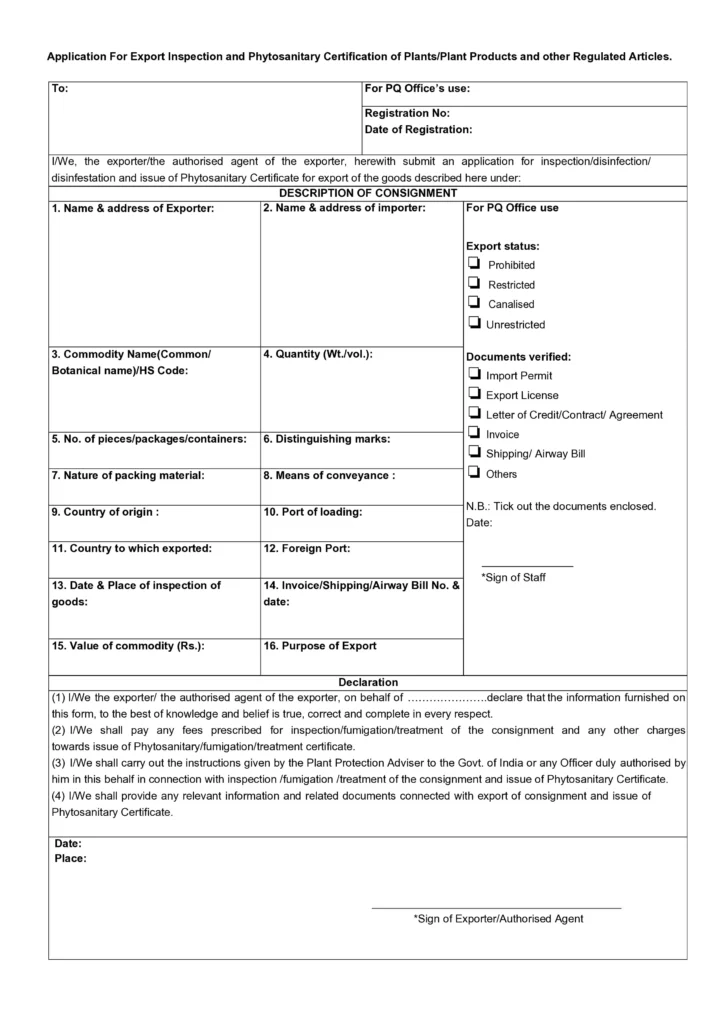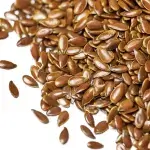
How To Get Phytosanitary Certificate In India?
A phytosanitary certificate (PSC) is indispensable when transporting/exporting regulated commodities. PSC is an official document issued by the National Plant Protection Organization (NPPO) or an authorized government agency in the exporting country. This certificate is crucial for the international trade of plants, plant products, and other regulated articles. The primary purpose of a Phytosanitary Certificate (PSC) is to ensure that the exported goods comply with the phytosanitary requirements and regulations of the destination country. The NPPO oversees this process to thwart the dissemination of pests, contaminants, or illnesses into the importing country. It is the facilitation of smooth and compliant cross-border movements of plants and plant products. We can say, “the Phytosanitary Certificate is an essential tool in international trade, contributing to the protection of agriculture and, the prevention of the spread of pests and diseases.”
Key Features And Aspects of The Phytosanitary Certificate Include:

Regulatory Compliance:
The PSC serves as evidence that the exported consignment adheres to the phytosanitary regulations and standards set by the importing country. It confirms that the plants or plant products are free from pests, diseases, and contaminants that could pose a risk to the recipient country’s agriculture and environment.
Authorized Issuance:
Only authorized personnel from the NPPO or a government agency sanctioned by the NPPO have the authority to issue a Phytosanitary Certificate. These individuals are trained to inspect and verify that the exported goods meet the necessary phytosanitary criteria.
Contents of the Certificate:
The certificate typically includes information such as the name and address of the exporter, details about the consignment (quantity, description, packaging), the origin of the products, and a declaration that the shipment complies with the phytosanitary regulations of the importing country.
Inspection and Verification:
Before issuing the Phytosanitary Certificate, the competent authorities conduct inspections and verifications to ensure that the consignment meets the required standards. This may involve checking for pests, diseases, and compliance with specific packaging and labeling requirements.
Destination Country Requirements:
The specific phytosanitary requirements vary from country to country. The exporting entity must be aware of and adhere to the regulations of the destination country, as failure to comply may result in the rejection or quarantine of the shipment.
International Standards:
The issuance of Phytosanitary Certificates aligns with international standards and agreements, such as those established by the International Plant Protection Convention (IPPC). This helps facilitate global trade by promoting uniformity and transparency in phytosanitary measures.
Risk Mitigation:
The certificate plays a crucial role in mitigating the risk of introducing harmful pests, diseases, or contaminants into new environments. This is particularly important for protecting agriculture, biodiversity, and ecosystems in the importing country.
Customs Clearance:
Customs authorities in the importing country require the Phytosanitary Certificate as part of the documentation for clearing the consignment through customs. It serves as proof that the shipment has undergone the necessary phytosanitary inspections and meets the regulatory standards.
Type of Phytosanitary Certificate

There are several types of phytosanitary certificates, each serving a specific purpose based on the nature of the exported plants, plant products, or regulated articles. The types of phytosanitary certificates include:
Phytosanitary Certificate for Export:
This is the standard certificate issued for plants, plant products, or other regulated articles intended for export. It confirms that the consignment complies with the phytosanitary regulations of the destination country.
Re-Export Phytosanitary Certificate:
Plants or plant products have been imported, undergo processing or treatment in the importing country, and are then re-exported, a re-export phytosanitary certificate may be required.
Phytosanitary Certificate for Import:
Its purpose is to assure that the imported plants, plant products, or other regulated articles comply with the phytosanitary regulations and standards of the importing country
Phytosanitary Certificate for Seed Export:

Specifically for the export of seeds, this certificate certifies that the seeds meet the phytosanitary standards and requirements of the destination country. It may include information on seed quality, varietal characteristics, and freedom from diseases or pests.
Phytosanitary Certificate for Nursery Stock:

This certificate is issued for the international trade of nursery stock, such as plants intended for planting or propagation. It verifies that the nursery stock is free from pests and diseases and complies with the phytosanitary regulations of the destination country.
Phytosanitary Certificate for Cut Flowers and Foliage:

Cut flowers and foliage require a specific phytosanitary certificate. It attests that these products have been inspected and found free from pests and diseases, meeting the phytosanitary standards of the importing country.
Phytosanitary Certificate for Fresh Fruits and Vegetables:

This certificate is tailored for the export of fresh fruits and vegetables. It certifies that the produce is free from pests, diseases, and contaminants and complies with the phytosanitary regulations of the destination country.
Phytosanitary Certificate for Wooden Packaging Material:

Some countries have strict regulations regarding wooden packaging material to prevent the introduction of wood-boring pests. This certificate is issued for wooden pallets, crates, or packaging materials to confirm they meet the phytosanitary requirements.
Phytosanitary Certificate for Plants for Planting:

This certificate is specific to plants intended for planting, including seeds, seedlings, and other propagative materials. It ensures that these items are free from pests and diseases, complying with the phytosanitary standards of the importing country.
Phytosanitary Certificate for Agriculture Commodity:

A Phytosanitary Certificate for agricultural commodities is issued for the international trade of agricultural products. This certificate is crucial to ensure that the exported agriculture commodities comply with the phytosanitary regulations and standards of the importing country.
Phytosanitary Certificate for Food Grains

A Phytosanitary Certificate for Food Grains is a specialized type of phytosanitary certificate issued for the international trade of food grains. This certificate is essential to confirm that the exported food grains meet the phytosanitary regulations and standards of the importing country.
To obtain a phytosanitary certificate in India for an export shipment, you need to follow a few steps.

Understand Destination Country Requirements:
Each country has its own set of regulations and requirements for importing plants and plant products. Before applying for a phytosanitary certificate, make sure you are aware of the specific requirements of the destination country. You may need to contact the agricultural department or embassy of the destination country for this information.
Prepare the Shipment:
Ensure that your shipment complies with the phytosanitary requirements of the destination country. This may involve, quality parameters, specific packaging guidelines, and meeting other agricultural standards.
Apply for a Phytosanitary Certificate:
Once your shipment is ready, you can apply for a phytosanitary certificate. You will need to apply an application to the Plant Protection, Quarantine & Storage, Department of Agriculture in India, and provide details about the type of consignment, its origin, and destination. You may also need to provide supporting documents, such as invoices, packing lists, and certificates of origin.
List of Documents for Phytosanitary Certificate (PSC)
- License of Import Export Code (IEC)
- Certificates of Origin (COO)
- Invoice of Shipment
- Packing List of Shipment
- Fumigation Certificate of Shipment
Payable Fees for Phytosanitary Certificate (PSC):
There may be fees associated with the inspection and issuance of the phytosanitary certificate. Make sure to inquire about the applicable fees and payment procedures.
Inspection and Certification of Shipment:
The authorities may conduct an inspection of your consignment to ensure it meets the required standards. If everything is in order, they will issue the phytosanitary certificate.
Receive the Phytosanitary Certificate:
Once the inspection and certification process is complete, you will receive the phytosanitary certificate. This document should accompany your shipment during transportation.
Submit Documents to Customs:
Provide the phytosanitary certificate along with other required export documents to customs authorities to facilitate the smooth clearance of your shipment.
Conclusion
In conclusion, the Phytosanitary Certificate (PSC) stands as a crucial document in international trade, safeguarding agriculture and preventing the spread of pests and diseases. Its significance lies in ensuring regulatory compliance, authorized issuance, and adherence to destination country requirements. The Phytosanitary Certificate serves as proof that exported consignments meet phytosanitary standards and undergo thorough inspection and verification. The certificate, aligned with international standards, plays a vital role in mitigating risks associated with the introduction of harmful elements into new environments. With various types catering to specific commodities, the Phytosanitary Certificate is a versatile tool for diverse aspects of international plant trade, from seeds to fresh produce and packaging materials. The process of obtaining a phytosanitary certificate involves understanding destination country requirements, preparing the shipment accordingly, and following a structured application and inspection procedure. By adhering to these steps, exporters contribute to the facilitation of smooth and compliant cross-border movements, emphasizing the role of the Phytosanitary Certificate as an indispensable instrument in global agricultural trade.
Get More Help And Assistance For Obtain Phytosanitary Certificate Click On The Link: Phytosanitary Certificate Assistance
FAQ’s
Q. How to apply for phytosanitary certificate in India?
A. To apply for a phytosanitary certificate(PSC) in India, exporters must initially understand the specific regulations of the destination country by contacting the agricultural department or embassy. Once the shipment is prepared in accordance with phytosanitary requirements, applicants can submit an application to the Plant Protection, Quarantine & Storage Department of Agriculture in India. Essential documents, including Import Export Code (IEC) license, Certificates of Origin (COO), and others, need to be provided. Additionally, applicants should inquire about applicable fees for inspection and payment procedures. The competent authorities will conduct inspections to ensure compliance, and upon approval, they will issue the phytosanitary certificate. The final step involves submitting the certificate along with other export documents to customs authorities for smooth clearance. This process ensures that exported goods meet the necessary phytosanitary standards, contributing to the facilitation of international trade from India.
Q. Why require a phytosanitary certificate in India?
A. The requirement for a phytosanitary certificate depends on the regulations of the importing country and the nature of the goods being exported. In general, a phytosanitary certificate is typically required for the international trade of plants, plant products, seeds, and certain other regulated articles. The certificate ensures that the exported items comply with the phytosanitary standards and regulations of the destination country, helping to prevent the spread of pests, diseases, and contaminants.
Q. Phytosanitary certificate required for which products?
A. It’s important for exporters to thoroughly research and understand the phytosanitary requirements of the specific destination country. Regulations can vary widely, and failure to comply with these requirements may lead to the rejection or quarantine of the shipment. Here are common situations where a phytosanitary certificate may be required:
Plants and Plant Products:
Exporting live plants or plant products, including fruits, vegetables, flowers, and other horticultural items.
Shipping seeds, bulbs, or other propagative materials.
Exporting timber or wooden packaging material.
Food Grains: Exporting food grains, such as wheat, rice, barley, maize, oats, or other cereals.
Nursery Stock: Trading nursery stock, which includes plants intended for planting or propagation.
Seed Export: Exporting seeds for agricultural or horticultural use.
Cut Flowers and Foliage: Exporting cut flowers or foliage.
Wooden Packaging Material: Using wooden pallets, crates, or packaging material for the shipment.
Q. Why is need a phytosanitary certificate in India?
A. A phytosanitary certificate is required for several reasons related to the protection of agriculture, prevention of the spread of pests and diseases, and compliance with international trade regulations.
Q. Who issues phytosanitary certificate in India?
A. In India, the Phytosanitary Certificate (PSC) is issued by the Plant Protection Quarantine and Storage (PPQS) department, operating under the Ministry of Agriculture and Farmers Welfare. To obtain a PSC, exporters must adhere to a process that involves understanding the specific phytosanitary regulations of the destination country, preparing the shipment accordingly, and applying to the PPQS with detailed information about the consignment. Inspections conducted by PPQS authorities verify compliance, and upon approval, they issue the Phytosanitary Certificate. This document is crucial for international trade, ensuring that exported plants, plant products, and regulated articles meet phytosanitary standards and prevent the spread of pests and diseases. It is then submitted to customs authorities for smooth clearance, emphasizing its significance in facilitating compliant cross-border movements.